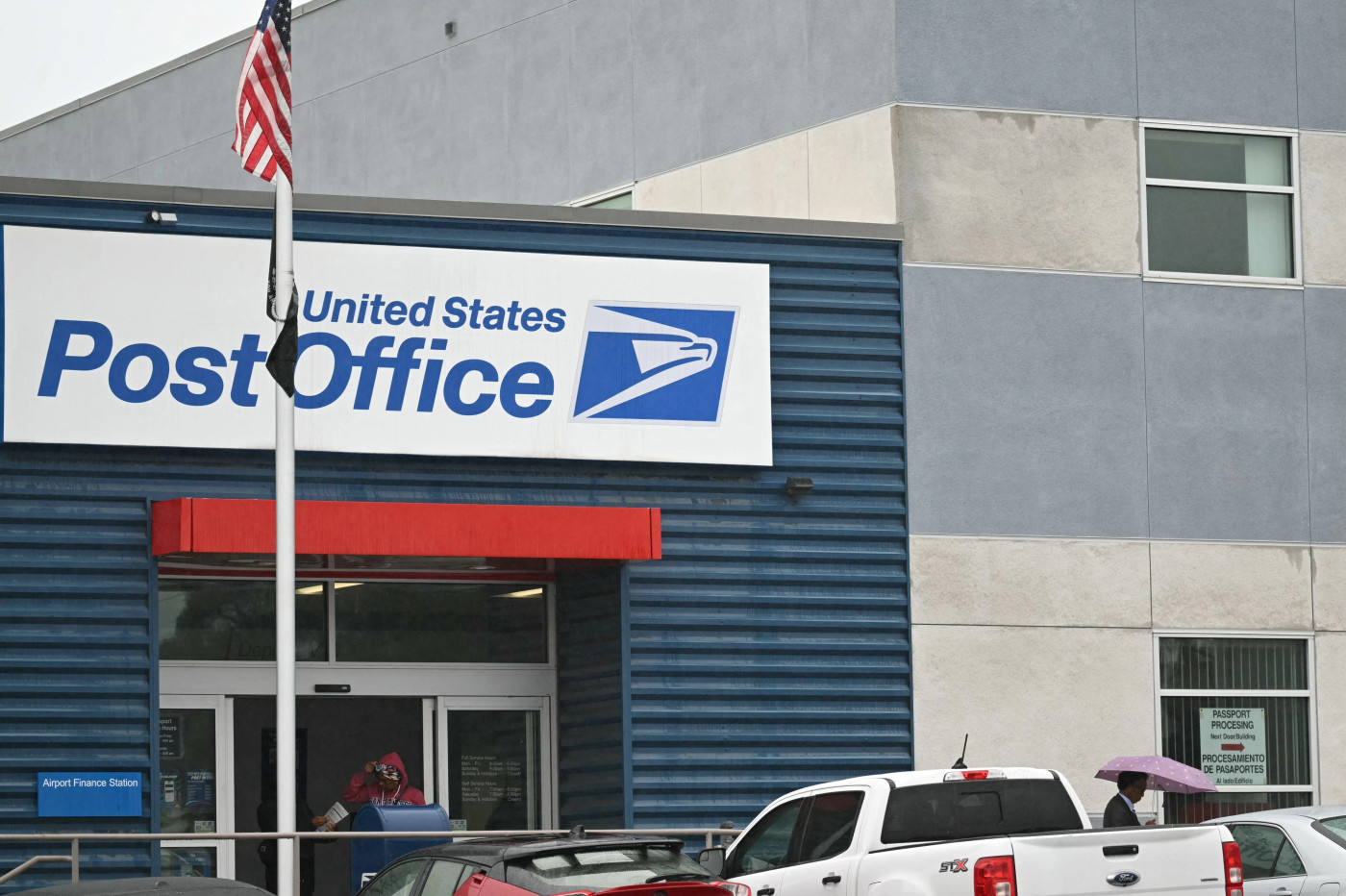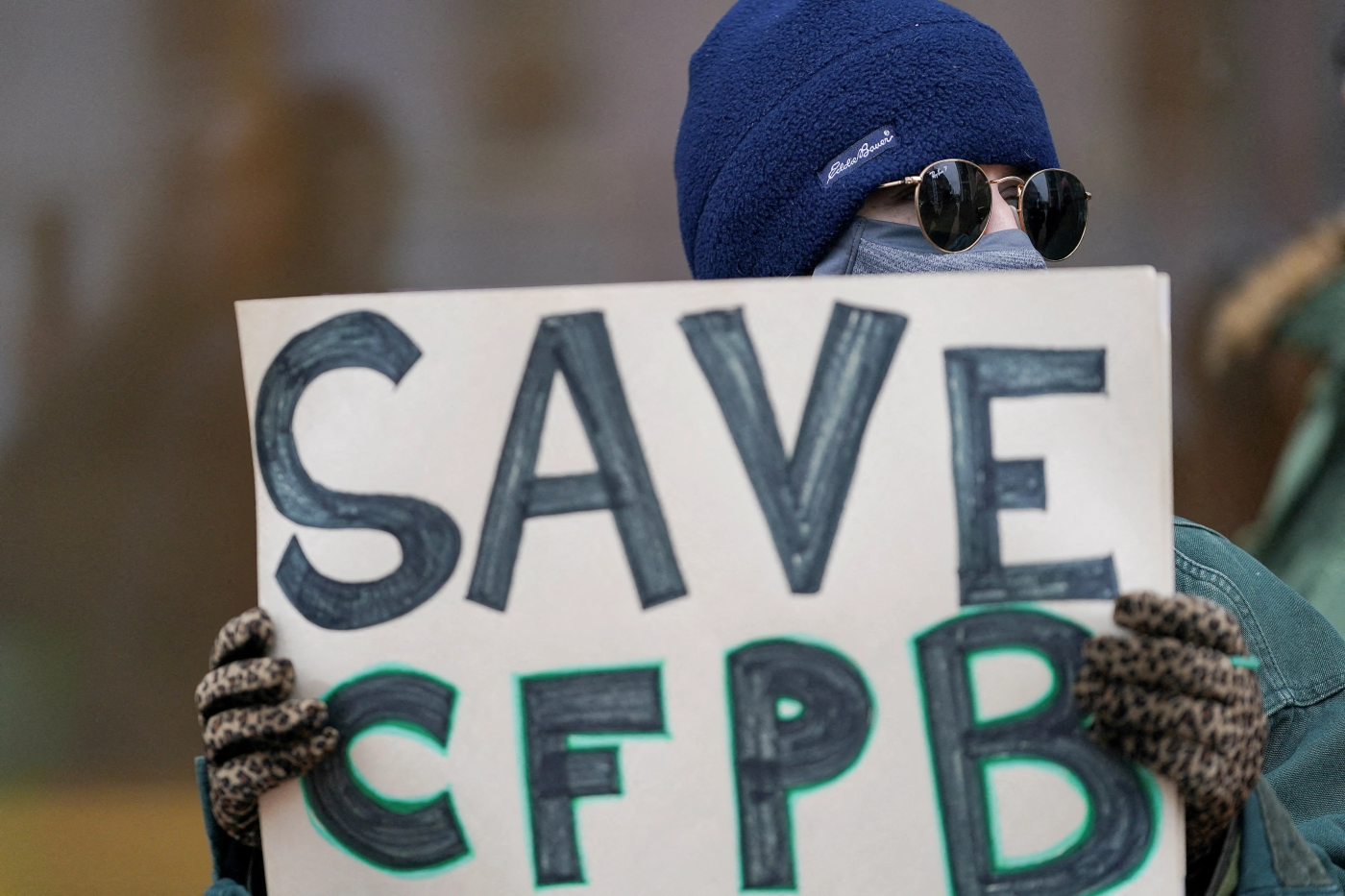
Consumers don't need more hidden fees, tricky loans, or a repeat of the financial crisis
- CFPB has taken action over the years against Toyota Motor Credit, Comerica, Cash App and more.
- The agency was born out of mortgage crisis.
For years, I told consumers who ran into problems with their auto loans, mortgages, credit cards, payment apps, student loan servicers, credit reports and more to reach out to the Consumer Financial Protection Bureau and file a complaint.
It's the go-to federal agency for reporting financial fraud, hidden fees, scams, abusive practices and more. The one-stop shop for protecting consumers and making sure they're treated fairly by banks, lenders and other financial institutions.
But since last week, no more. Do you hear that sound? It's a ton of complaints that Wall Street and big banks would love to see the Trump administration dump into a digital trash can.
Get ready for a he-said, she-said about who is wasting more money and engaging in more fraud — a government agency created by Congress in 2010 or players on the financial landscape, including big banks, money apps, mortgage companies and the like.
After a wild few days of emails and intrigue, the Trump administration moved to shutter the Consumer Financial Protection Bureau Monday morning.
Need a break? Play the USA TODAY Daily Crossword Puzzle.
Don't like waste? Who does? But I never imagined an angry mom dragging a refrigerator to the curb after one too many weeks of pitching moldy cheese and mushy veggies. Frustrated? Sure, but you don't throw out major appliances that still work to deal with common headaches.
Throwing out the CFPB isn't a "Saturday Night Live" skit in the making, like, perhaps, President Donald Trump's executive order Feb. 10 to end the "procurement and forced use of paper straws."
The White House fact sheet states: "The irrational campaign against plastic straws has forced Americans to use nonfunctional paper straws. This ends under President Trump."
OK, I'm going out on a limb here to admit that I've never been a fan of paper straws.
Tossing aside an independent agency designed to offer consumers financial protection, well, that's something that really goes against a good deal of what I've learned on this job.
Read more:Is Trump hurting or helping Americans by freezing Consumer Financial Protection Bureau?
How the CFPB will move forward remains up for debate. Last Tuesday evening, Trump did announce that he intends to nominate former Federal Deposit Insurance Corporation board member Jonathan McKernan to serve as his director of the Consumer Financial Protection Bureau. It was a move that was applauded by bankers.
The Consumer Bankers Association issued a statement indicating that the bankers looked forward to working with McKernan, if confirmed, and anticipated that he would "undo many of the most recent actions" of the CFPB under the Biden administration.
"In countless instances, the CFPB regularly strained — or flat out disregarded — the clear language of its legal authority to advance blatant political goals," according to a Consumer Bankers Association white paper on "reforming the CFPB."
The American Bankers Association also said McKernan was an excellent choice, and expressed hope that his nomination could be an important turning point to lead the CFPB in a "new direction."
So while the CFPB stopped work this week, and likely will stop for some time, it's also might be expected that the agency would resume operations under new leadership.
No matter, plenty of consumer advocates remain concerned.
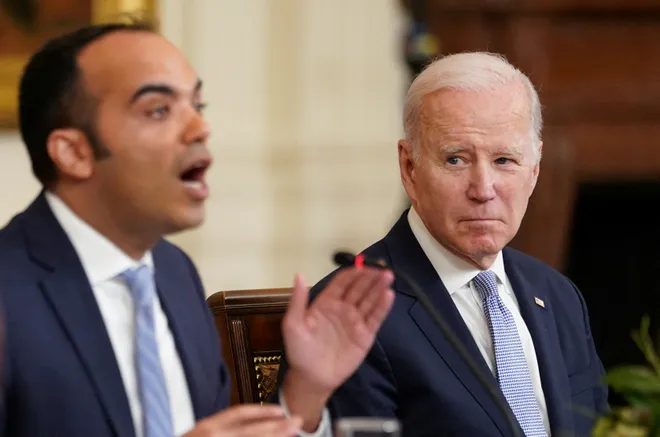
"This is an agency that touches all of our lives," said Lauren Saunders, associate director for the National Consumer Law Center.
Saunders noted a long list of ways that the CFPB has worked to address everything from rip-offs to tricks and traps in financial products. Now, she said, "it's anyone's guess" as to what will happen as many lawsuits initiated by the CFPB remain in limbo.
Before the CFPB, she said, many problems relating to complex financial products went unaddressed.
"If a mortgage exploded, nobody was really paying attention."
One of the latest efforts involved taking medical debt off credit reports.
Consumers, according to the CFPB, frequently report "receiving inaccurate bills or being asked to pay bills that should have been covered by insurance or financial assistance programs."
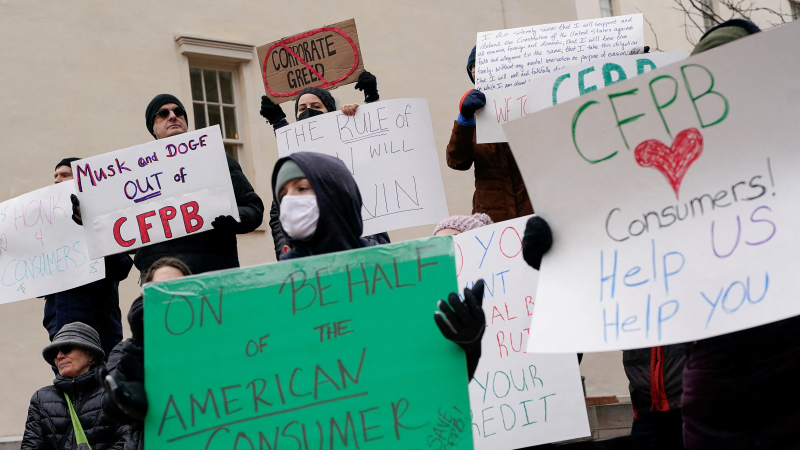
The CFPB also moved in recent years to shut down a loophole that credit card issuers have used to push through higher late fees on credit cards. But that effort to drop late fees on credit cards to $8 from $30 or $41 typically was put on hold after banking industry groups took legal action.
Consumers got hit by some bad products
While it is popular some 15 years later to shift blame to millions of consumers who lost their homes to foreclosure, saying they took on too much debt or didn't read the fine print, it's not all driver error, folks.
Wall Street and big banks played a real role in engineering a credit crisis that came dangerously close to nearly taking down the U.S. financial system.
I witnessed it firsthand as a columnist for the Detroit Free Press who was out front writing about the financial hardships felt in Michigan during the crisis.
The credit crunch began in the summer of 2007 in mortgages but shifted into an economic freefall across the economy. Even people who didn't borrow money lost wealth as their home values tumbled and 401(k) plans imploded.
Desperate times called for desperate measures, like a $700 billion financial bailout signed by President George W. Bush in early October 2008. If Wall Street didn't get help, economists said, the crisis would only deepen and take even more jobs with it. Something needed to be done to deal with all the bad mortgage-related debt.
A need, not a want
The financial industry never wanted the Consumer Financial Protection Bureau, which was born out of mortgage lending abuses and created by Congress as part of the Dodd-Frank Wall Street Reform and Consumer Protection Act of 2010.
"We estimate 7 million homeowners were ultimately foreclosed on in part due to those abuses," said Mark Zandi, chief economist for Moody's. Zandi wrote a book published in 2008 called "Financial Shock: A 360 Degree Look at the Subprime Mortgage Implosion."
Zandi noted that the CFPB expanded its oversight beyond mortgages to other types of lending to households, including payday loans; buy now, pay later loans, and subprime auto loans.
"While many lenders have chaffed at the CFPB’s oversight, and there are plusses and minuses to it, on net I think the CFPB has been beneficial to borrowers and lenders," Zandi said.
The CFPB, he said, has made sure that the most aggressive and least responsible lenders are held accountable. The goal is to focus on ensuring that lending is sustainable for borrowers.
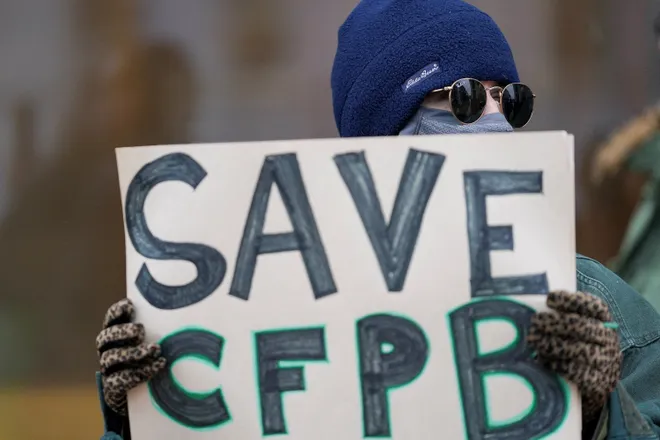
It was clear then — as it's clear to me now — that many consumers don't stand a chance when there isn't a consumer cop on the beat with the power to address violations in financial laws, including shoddy practices, fraud and hidden fees.
"The CFPB's basic mission is to protect American consumers from being ripped off," said Donald Moynihan, the J. Ira and Nicki Harris family professor of public policy at the Gerald R. Ford School of Public Policy at the University of Michigan in Ann Arbor.
Trump doesn't have the power to eliminate the agency, which was established by Congress, he said, but the latest actions by the administration indicate an intention to do just that.
"Telling employees to stop work and stay home, as Russ Vought is doing, is not just incredibly wasteful, it is also a backdoor means to close the agency," Moynihan told the Free Press.
Vought, the newly confirmed director of the Office of Management and Budget and acting head of the CFPB, sent an email to the agency's staff to tell them to basically stand down, stop pending investigations and not perform any tasks relating to their work.
Vought is playing a key role revamping the federal government, rolling out Trump's agenda, and moving the conservative policy recommendations outlined in Project 2025 forward.
Even if the CFPB isn't disbanded, as could be the case after legal challenges, the risk ahead is that consumers will see an agency under the Trump administration that will not address financial wrongdoing.
Michigan Attorney General Dana Nessel said the CFPB carries the full force of federal law to "hold the bad actors accountable."
The agency, she said, uses its authority to "shield Americans from deceptive fees and practices that siphon millions from working families, unfair contractual terms that lock consumers into terrible deals, and financial products such as shady auto loans, predatory mortgages, and crooked investment and banking accounts that rob borrowers blind to pad the big bankers’ pockets.”
Many Republican leaders and special interest groups have tried for years to put an end to the CFPB. In May 2024, the U.S. Supreme Court upheld the funding system for the Consumer Financial Protection Bureau.
The CFPB is funded through the Federal Reserve — as a way to shield it from political pressure — and doesn't go through budget battles in Congress. Critics called the arrangement one that violated the Constitution.
"I don't have much faith that the CFPB will continue aggressive enforcement of financial institutions, especially if those financial institutions are supporters of the president," Moynihan said.
"If it continues to exist, the mission will be redirected to shield financial institutions from what Trump sees as excessive regulation. The public will lose one of its most able advocates in government," he said.
Obtaining relief for consumers
During the first Trump administration, the consumer bureau's acting director Mick Mulvaney, who held that job from late 2017 through late 2018, was criticized by some for repeatedly undercutting the agency. But we didn't see this level of animosity and effort to shut down the entire agency.
For years, though, the independent federal agency took serious enforcement actions, which were spurred by consumer complaints and investigative reports.
More than $21 billion in relief was obtained. That figure, according to the bureau, includes monetary compensation, principal reductions, canceled debts and other consumer relief.
More than $5 billion in civil penalties was imposed by the CFPB on companies and individuals that violate the law.
I've reported on all sorts of these cases, including one in 2023 where Toyota car buyers complained that they took out auto loans through the automaker's financing arm but then faced incredible hurdles when they tried canceling extra insurance products that boosted their monthly car loan payments.
In 2023, the CFPB ordered Toyota Motor Credit to pay $48 million to harmed borrowers.
The order included requiring Toyota Motor Credit to pay a $12 million penalty into the consumer bureau's victims relief fund.
"Representatives on the hotline were instructed to keep promoting the products until a consumer had verbally requested to cancel three times, at which point the representatives would tell the consumer that it was only possible to cancel by submitting a written request," according to the CFPB's statement in 2023.
Back in 2012, the young federal watchdog agency held a special town hall at the Detroit Institute of Arts. Then, the bureau was drafting new regulations involving the oversight of the largest credit reporting bureaus and debt-collection companies. Many consumers reported that they faced a great deal of difficulty in getting errors corrected on their credit reports and complained of unsettling encounters with overly aggressive debt collectors.

When I attended that town hall, I met Carol Long, then 65, who stood in the Kresge Court at the DIA and told the crowd that she discovered she was listed as "deceased" based on the copy of her credit report she obtained in January 2012.
"I think they got the wrong Carol," said Long, who lived in Grand Blanc. She was told that the problem was fixed that spring, but when she tried to refinance in the summer of 2012, she was again listed as "deceased."
We also heard a story in Detroit about a young man who wanted to buy a house but faced trouble getting a mortgage because his credit report was wrongly tarnished by his father's tax troubles.
Real issues like these often didn't get easily resolved without added federal regulation and oversight.
The CFPB began direct supervision of companies, such as Equifax, TransUnion and Experian, in September 2012. The objective was to make sure information is reliable and accurate.
As a journalist, I've heard from consumers in recent years with all sorts of challenges and complaints, including losing money to fraud and scams via payment apps, like Zelle.
At the same time, we've heard from financial institutions about how the CFPB is "overreaching its authority." The phrase became increasingly common late last year after Trump won the presidential election and the CFPB rolled out more enforcement actions and lawsuits in the final weeks of President Joe Biden's administration.
In early December, the CFPB filed a complaint in the U.S. District Court for the Northern District of Texas against Comerica accusing the bank of "systematically failing its 3.4 million Direct Express cardholders — primarily unbanked Americans."
As part of its emailed response to the Detroit Free Press, Comerica noted that the bank filed a lawsuit Nov. 8 against the CFPB “challenging the bureau’s regulatory overreach and its handling of this case, which undermined the legitimacy of its own investigation. Today, the CFPB doubled down by filing a countersuit against Comerica Bank.”
The Dallas-based bank with strong Detroit ties lost its 16-year-old contract with the federal government involving the Direct Express card in November 2024. Comerica said then that it would continue to “vigorously defend our record as the financial agent for the Direct Deposit program and remain committed to serving our cardholders.”
In late December, the CFPB sued Bank of America, JPMorgan Chase and Wells Fargo saying they failed to protect consumers from widespread fraud on the popular peer-to-peer payment network. The independent agency also sued the operator of Zelle, called Early Warning Services.
"What they built became a gold mine for criminals," Rohit Chopra, then-CFPB director, said in December. He said the major financial institutions failed to fix glaring flaws in the system while marketing Zelle's near-instant electronic money transfers as safe.
Early Warning Services, which designed and operates Zelle, is co-owned by seven big banks — Bank of America, Capital One, Chase, PNC Bank, Trust, U.S. Bank and Wells Fargo. Early Warning Services is a financial technology and consumer reporting company based in Scottsdale, Arizona.
Bankers defended the safety of the Zelle app, and said the CFPB was overreaching in its actions.
Zelle said in a statement to the Detroit Free Press then that the CFPB was attempting to expand the existing law and appeared to be timing the lawsuit based on political factors unrelated to Zelle.
In January, the CFPB sued Experian, the nationwide consumer reporting agency, saying it unlawfully failed to properly investigate consumer disputes.
The CFPB alleges that Experian "does not take sufficient steps to intake, process, investigate, and notify consumers about consumer disputes, resulting in the inclusion of incorrect information on credit reports."
Such issues can be harmful for those who want to take out a car loan, get a mortgage or build a better financial future in other ways. "Inaccurate or false information on consumer reports can threaten consumers’ access to credit, employment, and housing," the CFPB noted.
Many may be expecting to get a settlement this spring out of peer-to-peer payment Cash App. Not sure how that's going to work now if the CFPB remains shuttered. Cash App faced paying up to $120 million in refunds and other redress to harmed customers, plus $55 million in penalties, relating to its handling of customer service and a spurt in fraud.
'Page not found'
Last week, I went to ConsumerFinance.gov and saw zip. Just a 404 error, "page not found." It's an incredibly weird feeling to see a government page just sort of vanish.
I say "sort of" because oddly enough, you still could click on some of the tabs, such as one for "consumer education" and still get information on auto loans and other products. By clicking on those tabs, you could even scroll down to a way to file a complaint.
Granted, it seemed really unlikely this week that anyone would see your complaint anymore.
(This story has been updated to include new information.)
Contact personal finance columnist Susan Tompor: [email protected]. Follow her on X @tompor.
